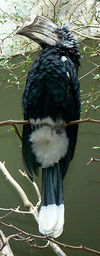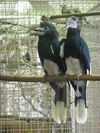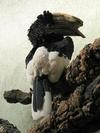Genus Bycanistes

Silverycheeked Hornbill - The Silvery-cheeked Hornbill is a large bird, with length from 75 to 80 cm, characterized by a very large creamy casque on the beak, smaller in females. The head is silver-grey and the rest of the plumage is black, except for a broad white stripe on the lower back. Silvery-cheeked Hornbills are uncommon localized residents of the tall evergreen forests of East Africa from Ethiopia to South Africa. In Zimbabwe they are threatened by habitat destruction. Usually they live in pairs and sometimes roost in flocks of hundreds of individuals. This hornbill feeds on fruits, insects, small birds, rodents, small reptiles and centipedes. They breed in spring and lay clutches of 1 to 3 white eggs, incubated for 40 days. The young remain with both parents for circa 80 days.
Trumpeter Hornbill - The Trumpeter Hornbill, Bycanistes bucinator, is a medium-sized hornbill, with length between 58 to 65 cm, characterized by a large grey casque on the bill, smaller in females. The eyes are brown or red, with pink surrounding skin. They are similar to Silvery-cheeked Hornbill. Distinguishing features include an all-black back, white belly and white underwing coverts , and red facial skin.
Brown-cheeked Hornbill - The Brown-cheeked Hornbill is a species of hornbill in the Bucerotidae family. It is found in Ivory Coast, Ghana, Guinea, Liberia, Sierra Leone, and Togo. Its natural habitats are subtropical or tropical moist lowland forests, plantations , and heavily degraded former forest. It is threatened by habitat loss.
Piping Hornbill - The Piping Hornbill is a species of hornbill in the Bucerotidae family. It is found in Angola, Benin, Cameroon, Central African Republic, Republic of the Congo, Democratic Republic of the Congo, Ivory Coast, Equatorial Guinea, Gabon, Ghana, Guinea, Guinea-Bissau, Liberia, Mali, Nigeria, Senegal, Sierra Leone, Sudan, Togo, and Uganda.
Black-and-white-casqued Hornbill - The Black-and-white-casqued Hornbill is distributed to evergreen forests and savanna across equatorial Africa, in central and western Africa. A monogamous species, pairs nest in suitable tree cavities. The female usually lays up to two eggs. The diet consists mainly of figs, fruits, insects and small animals found in the trees.




